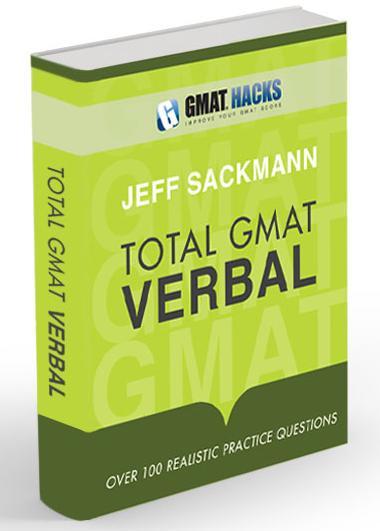
Bookshelf
|
|
Total GMAT Math Jeff's complete Quant guide, on sale now! |
|
|
Total GMAT Verbal Everything you need to ace GMAT Verbal! |
1,800 Practice Math Questions
Buy Jeff's books at Amazon.com

GMAT Official Guide, with IR
OG Math | OG Verbal
OG12 & Quant Rev solutions!
GMAT Question of the Day
Beginner's Guide to the GMAT
GMAT Hacks Affiliate Program

Recent Hacks

Categories
- General Study Tips
- Goals and Planning
- CAT Strategy
- The Mental Game
- GMAT Math Strategy
- GMAT Math Topics
- Mental Math
- Data Sufficiency
- Critical Reasoning
- Reading Comprehension
- Sentence Correction
- Analytical Writing Assessment
- Integrated Reasoning
- IR Explained
- Business School Admissions
- GMAT Prep Resources
- Practice Questions
- Total GMAT Math
- Total GMAT Verbal
- GMAT 111

Using "I" In the Analytical Writing Assessment
| You should follow me on Twitter. While you're at it, take a moment to subscribe to GMAT Hacks via RSS or Email. |
Many of us are taught at an early age to avoid using the word "I" in essays. This is usually a good rule of thumb, but it isn't always easy to follow on the GMAT.
For instance, here is part of one common prompt for the Analysis of Issue essay:
Discuss the extent to which you agree or disagree with the opinion stated above. Support your views with reasons and/or examples from your own experience, observations, or reading.
If you're going to use "your own experience," as suggested, you'll have a hard time avoiding the word "I."
Statements of Opinion
When your middle-school English teacher told you not to use "I" in your essays, she wasn't concerned about your writing about personal experiences. She wanted to make your writing more forceful.
For instance, it's tempting to say, "I believe that the AWA is the least important part of the GMAT." However, it's more concise to say, "The AWA is the least important part of the GMAT."
Your reader knows that it's your opinion. When you insert a phrase such as "I believe that," or "my opinion is," you weaken your writing. Don't do it.
Personal Experiences
If you do choose to write about a personal experience, there's no problem with using the word "I." For instance, it's fine to write, "When I was an intern at a major U.S. financial institution...." If you're writing about yourself, there's no way around the word "I" other than archaic circumlocutions that have no place on the GMAT.
That said, you are better off avoiding personal experiences altogether. In the hundreds of GMAT practice essays I've seen over the years, writers sound more authoritative when they are talking about other things. When they use personal experiences, it feels like they are scraping the bottom of the barrel for arguments or anecdotes to support their thesis.
But it isn't the end of the world if you do use a personal experience. There's nothing stopping you from getting a 6 (a perfect score) on the AWA if you do--it's just a little harder.
About the author: Jeff Sackmann has written many GMAT preparation books, including the popular Total GMAT Math, Total GMAT Verbal, and GMAT 111. He has also created explanations for problems in The Official Guide, as well as 1,800 practice GMAT math questions.
 |
Total GMAT Verbal
The comprehensive guide to the GMAT Verbal section. Recognize, dissect, and master every question type
you'll face on the test. Everything you need, all in one place, including 100+ realistic practice questions. |